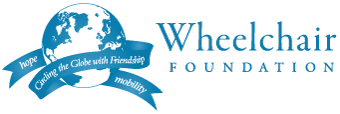Vietnam is a country in constant motion. Without a good set of wheels, it’s easy to get left behind. That’s especially true for Vietnamese wheelchair riders like Quan Dien. He lost his legs in the war with Cambodia in the early 1980s.
“I fell once, because the ramp to the sidewalk was blocked,” he tells FRONTLINE/World reporter Marjorie McAfee. “I was going too fast, and the wheelchair hit and I flew forward.”
Because the streets of his neighborhood aren’t wheelchair friendly, Quan mostly stays home in his small apartment. To make ends meet, he rents his back room workshop to another wheelchair rider, Thanh Giang, who contracted polio as a child.
“Vietnam still has a lot of shortcomings,” Thanh says. “They haven’t yet been able to find a way to improve things for disabled people. Usually, when they build things, they don’t think if it’s convenient for anyone. So, disabled people put up with a lot of difficulties.”
But a world away, there’s a new wheelchair, and it’s making an impact.
“I can hit it hard, and nothing happens,” says Ralf Hotchkiss, an engineering professor at San Francisco State who’s been thinking about wheelchair design for a long time.
“The wheel’s axels are very strong. You can come down a high curb, hit hard,” he demonstrates. “Nothing fails. This wheel – there’s no way I can break it.”
After becoming paralyzed in a motorcycle accident 30 years ago, Hotchkiss started out just trying to make a better wheelchair for his own use. But he ended up making a bigger breakthrough with something he calls the RoughRider.
“It was necessary to come up with the RoughRider because there was no other wheelchair that worked well enough in all of the difficult situations in developing countries,” he explains. “Everything you do you have to go long distances over rocky or sandy or muddy roads.”
Hotchkiss gathered design ideas from around the world. The front wheel comes from a shopping cart in Zimbabwe.
“Very flexible, very light. Made out of auto tire retread rubber,” he says.
After years of tinkering, Hotchkiss decided the RoughRider was ready for the rigors of the developing world. In 2006, he approached a factory owner named Toan Nguyen to talk about producing the wheelchairs in Vietnam.
“I saw that two people from the opposite sides of an ocean could meet to make this wheelchair,” Toan says.
Toan makes the RoughRider using locally available materials and inexpensive labor. It’s Hotchkiss’ visions that the RoughRider should be easy and cheap to make any place in the world. His associate, Marc Krizack, travels to Vietnam to check in with Toan whenever he can.
“It’s been how long, one year since I was here?” he says as he greets Toan.
He’s brought the latest innovation from San Francisco with him, a design modification that will allow for a smaller-sized wheelchair. As always, there’s no charge for design. Hotchkiss’ technologies are open source. And his Whirlwind Wheelchair Network also helps raise money from Western foundations to help the $175 cost of the chair.
“Wheelchair users don’t make the market – they can’t afford to buy their own wheelchairs,” says Krizack. “So what Whirlwind does is not only just transfer the technology to factories like Kien Tuong, but we also market the chairs. We try to raise the money so they can actually sell the chairs.
With Whirlwind’s help, Toan regularly donates his RoughRiders to those most in need. McAfee finds him at a disabled athletes tournament giving away chairs to the participants, including Thanh Giang, the man from Quan’s workshop.
“When it comes to competing, the wheelchair is very comfortable,” Thanh says. “It doesn’t block my arm movement.”
After the game, Thanh takes a ride through the neighborhood. He says it’s very sturdy and stable. Thanh’s landlord and friend, Quan, is more skeptical. He thinks his old chair suits him better.
“For me to get up in this chair, it’s very easy,” he says about his old chair. “Getting in and out of the RoughRider is impossible. I tried it. I’m not strong enough to push myself up from the ground with my hands.”
“The first rule of the wheelchair provision is ‘Do no harm,’” says Klizack. “You can give someone a wheelchair and it can be a very inappropriate wheelchair. It’d be like, you know, giving somebody a little sports car. Even if it’s the best Mercedes Benz sports car in the world, if the person lives in Alaska in the wintertime, they’re never going be able to use that.”
Klizack heard about Quan’s concerns, so he decides to pay him a visit, bringing Toan along as well. It out Quan got his first chair from Toan more than 20 years ago.
“Meeting again, it’s very emotional,” Toan says.
Quan explains that the RoughRider’s footrests are of no use to him, as he has lost his legs. Klizack says that the wheelchair is designed to be easily modified. Within minutes, they’ve raised the footrests to create a step. And they find another benefit – the footrests also can be used to carry groceries and the like. Quan decides to keep the chair after all.
For Hotchkiss, it’s been the same story all over the world. He’s brought the RoughRider to dozens of countries, including Mexico, Iraq and South Africa through partnerships with several factories abroad.
“I would like to see Whirlwind Wheelchair become unnecessary as soon as possible,” Hotchkiss says. “I would like to help to develop a self-sustaining competitive industry of wheelchair building all over the world. Once the marketplace is populated, hopefully by then there will be so many people working on and inventing wheelchairs, making wheelchairs better than ever, that maybe in 10, 20, 30 years we won’t even recognize today’s chairs. They’ll be history.”
